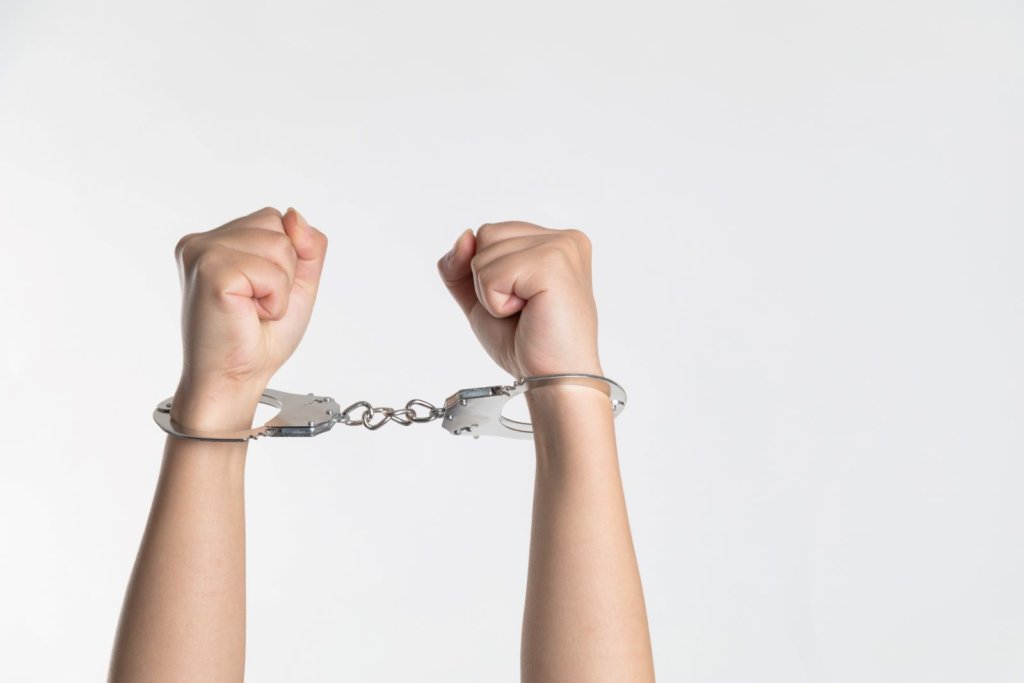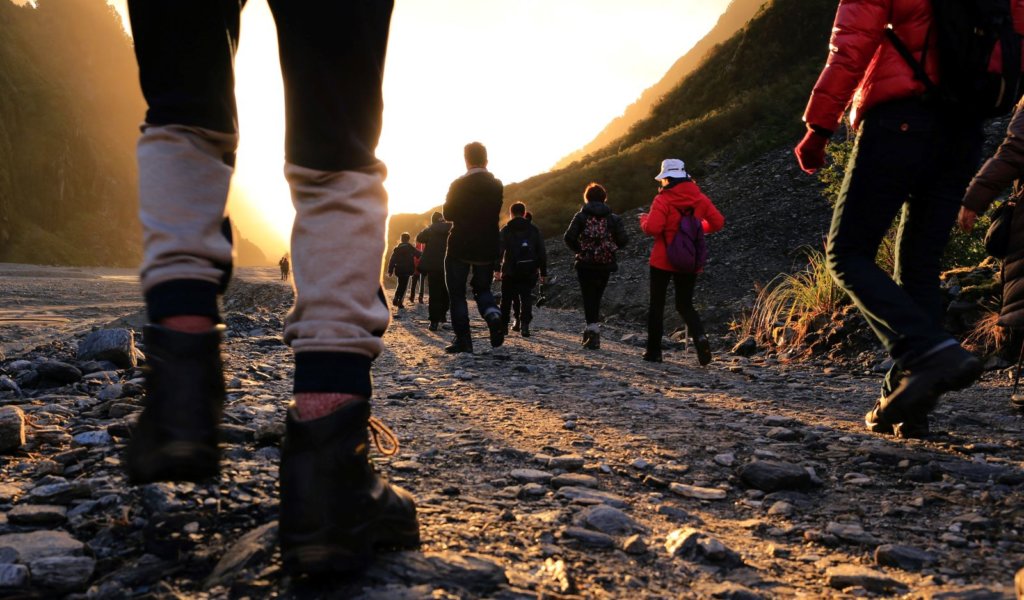I keep thinking about an essay I read in the book All I Really Need to Know I Learned in Kindergarten by Robert Fulghum. He writes about how he lived at the dead end of a dead-end street, two blocks long, at the bottom of a hill in north Seattle. At the top of the hill, two big yellow and black signs declared: STREET ENDS. And at the end of the street where Fulghum resided, another big sign with stripes and reflectors stated the obvious: DEAD END.
You could see that “DEAD END” sign a long way off – in other words, the dead end didn’t sneak up on you. However, what’s so remarkable is people drove down the street anyway and seemed to be baffled when the street did, in fact, end.
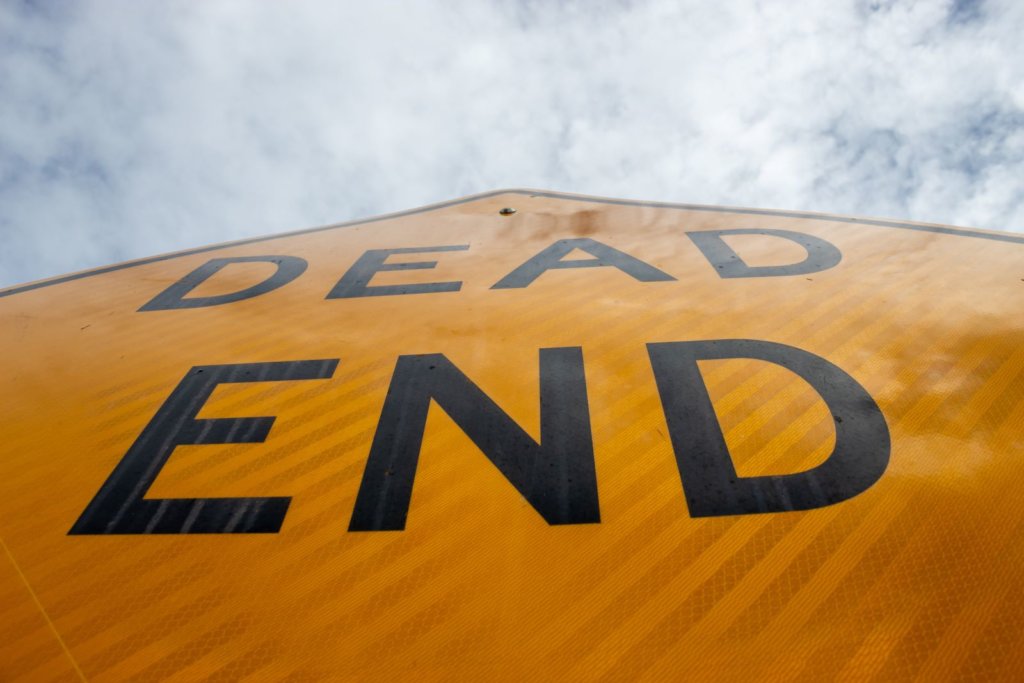
These signs are pretty obvious . . . if we accept them. Photo by Gabriel Soto on Unsplash
Fulghum writes:
“Not just part way, mind you. Not just to where the reality of the situation cleared up. No, sir. They drove all the way down, right up to the sign, the big black one with stripes, the one that said DEAD END.
“And they read that sign two or three times. As if they were foreigners and had to translate the English. They looked on either side of the sign to see if there was a way around it. Sometimes they sat there for two or three minutes adjusting their minds …. There was no pattern. All kinds of vehicles, all kinds of people, broad daylight and pitch dark. Even a police car a couple of times. And once a fire truck.
“Innate skepticism or innate stupidity? I confess I do not know. A psychiatrist friend tells me it’s a sample of an unconscious need to deny – that everyone wants the road or The Way to continue on instead of ending. So you drive as far as you can, even when you can clearly read the sign. You want to think you are exempt, that it doesn’t apply to you. But it does.”
His last two lines especially strike me. We want to think we are exempt, that whatever we’re confronting – a dead-end street, a deadly virus, whatever – doesn’t apply to us. But it does. I’d wager the majority of us want to feel special. We want to be right, to know the truth, and even when there’s evidence demonstrating we’re wrong, we can’t accept it. Why is that? I think one reason is U.S. culture doesn’t have many examples of people saying, “I don’t know.”
Instead of saying, “I don’t know,” we make something up, we pretend to know. We try to save face versus practicing humility and admitting, “I don’t know,” or even, “Maybe I’m wrong.” Who says maybe I’m wrong these days?!? I can’t remember the last time I heard in a public space someone open to the possibility they don’t know everything. It’s as if due to the internet and having so much knowledge at our fingertips we’re loathe to say, “I don’t know” or “I could be wrong.”
Also wrapped up in “I don’t know” is fear, in my opinion. My spiritual teacher says, “Humans do not fear to tread a known path, but they always hesitate and fear to travel unknown paths.” Sometimes those unknown paths are intellectual ones. It’s far easier to cling to a thought or belief you learned early on and is corroborated by friends and family than to change your mind and believe something new. I, for one, value bravery and I want other people to be brave too. I want us all to say “I don’t know” and “Maybe I’m wrong” when that’s the truth for us. And also, to pay attention to evidence when it stares at us in the face. We’d all be better for it.
I dream of a world where we recognize we aren’t exempt. A world where we understand if there’s a road sign that says “DEAD END,” that the street ends. A world we understand if we think we know something other people don’t, we’re likely deluding ourselves. A world where we’re OK with some uncertainty and we embrace the power of saying, “I don’t know” and “Maybe I’m wrong.”
Another world is not only possible, it’s probable.
I watched a viral video of a woman in California arguing why her kids shouldn’t be required to wear a mask to school. She told the school board they don’t have the authority to make that decision, and she cited the Declaration of Independence, the Constitution, and for some reason, the Federalist Papers.
My first response was to mock her, tell her what an idiot she is, why she’s wrong, etc. As we’ve seen though, fighting fire with fire only results in a conflagration. I kept mulling over the video and stumbled upon a passage from my spiritual teacher that softened me and offered some perspective on the situation. He said, “Everyone longs for liberation because bondage is not conducive to happiness …. all long for some kind of liberation – some in terms of freedom of action, some in terms of freedom on the intellectual level.”
We are all longing for liberation. We all want to escape from chains whether literal or metaphorical, and now when I think about the video, I start to wonder if maybe that’s what’s going on for this woman too. She doesn’t want someone else to tell her what to do or what her kids should do. She wants freedom but it’s coming out skewed. What I mean is, we as a society are brushing up against the confines of freedom in the physical and mental spheres. People want more and more freedom but the physical world imposes limits. You can’t have unlimited freedom on the earthly plane. You just can’t. But we still long for that so some people are taking that energy and ranting about wearing masks. I think what people are actually longing for is liberation from the bondage of being human.
According to my spiritual philosophy, every living being is on a journey from crudeness to subtlety. Every living being evolves over time to become more and more complex in all ways until finally that microcosmic entity becomes one with the macrocosmic entity. In other words, the source of all things. That’s what we’re all doing here. We’re constantly evolving physically, mentally, emotionally, and spiritually until one day we’re no longer even human. Watching this woman yell about freedom of choice, I now see her soul is yelling about a different sort of freedom. A thirst for freedom that will never be quenched on the physical plane and instead can only be satisfied on the spiritual one.
To quote my spiritual teacher again, he says, “There is in the living being a thirst for limitlessness. It is not possible for limited objects to quench one’s thirst. Brahma is the only limitless entity, and so establishment in Brahma’s bearing alone puts an end to all thirsts or cravings …. [A]nd so knowingly or unknowingly, human beings are indeed running after limitlessness.”
All of this is to say, I hear you, anti-mask lady. I hear your desire for freedom, for limitlessness, for no longer being ensnared by various bondages. I long for the same things and that’s why I have a devoted spiritual practice because I know what I really, really, really want cannot be found on Earth. And what you really, really, really want can’t either.
I dream of a world where we recognize the physical realm has its limits. A world where we understand our thirst for freedom can never be satisfied here, and instead, we turn to a spiritual practice to quench it. A world where we understand ultimately what we’re all longing for is liberation.
Another world is not only possible, it’s probable.
I realize Juneteenth has come and gone but I keep thinking about an article I read by Robin Washington where he said Juneteenth has been whitewashed. The tale we’ve been told is Union soldiers arrived in Galveston, Texas, on June 19, 1865 to inform enslaved African Americans they were free. As if they didn’t already know. However, historian Gregory P. Downs has firsthand accounts from people demonstrating they did know. Galveston’s Blacks knew they were free and so did their slaveholders, who nonetheless kept them in bondage using brute force.
That means General Gordon Granger didn’t read off from a scroll and let slaves know they were liberated. No, Granger and his soldiers let the slaveholders know the slaves were liberated – at the barrel of a gun. They used force to say, “Let these people go.”
One of the reasons this article has stuck with me is because it illustrates what motivates people to change. So often I think we as a society want to believe that if people only knew the truth, they would change out of the goodness of their hearts. If people only knew that by purchasing products made with palm oil, such as shampoo, cookies, peanut butter, microwave dinners, and more, they are contributing to the extinction of orangutans, they’d stop. (Side note: Palm oil has many names like “stearic acid” and “sodium lauryl sulphate” so it could be hiding in your products and you wouldn’t know.) And it’s true that sometimes informing people does move them enough to change their behavior.
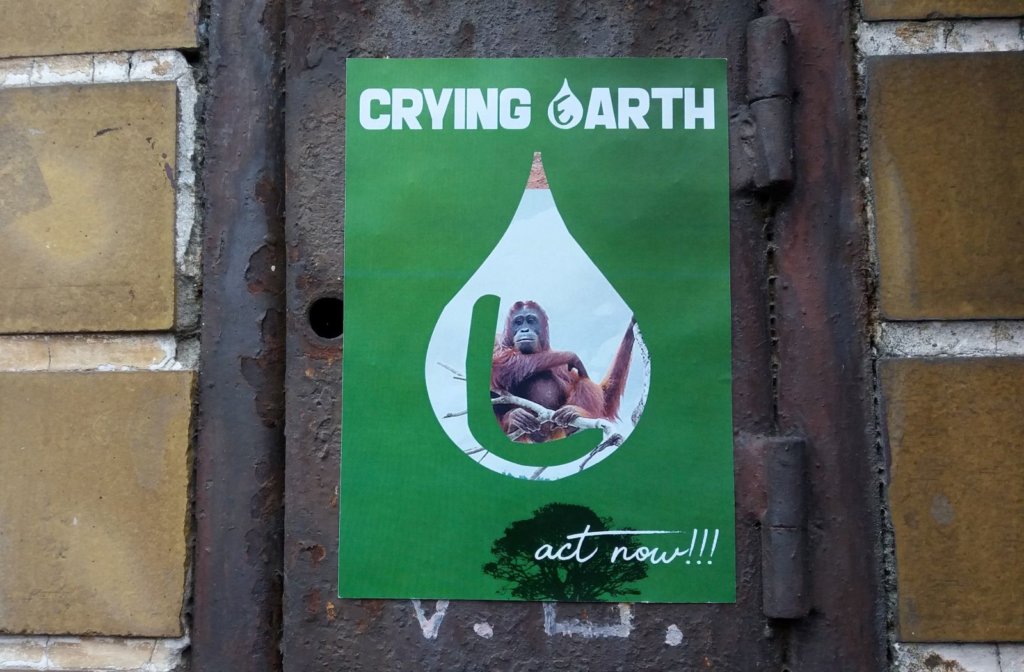
Will you help the orangutans? Photo by Marija Zaric on Unsplash
For instance, a friend of mine became vegan after watching a couple of documentaries. Up until that point, she didn’t put it together cows are raped and separated from their young in order to produce milk. She didn’t think about how cows, pigs, and chickens have personalities and consciousness like her dog does. She didn’t know the animals she ate screamed out in pain as they were slaughtered. But when she learned more, she changed her eating habits. However, not everyone is like my friend.
Some people know the truth and are still unwilling to change because it’s too hard, too complicated, too whatever. Some people, like the Civil War era Galveston slaveholders, will maintain the status quo until someone else forces them to change.
I think that’s why my spiritual teacher is not a pacifist. He says, “In all actions of life whether small or big, the unit mind progresses by winning over the opposing trends. Life develops through the medium of force.” Later on, he says, “In the absence of the ability to resist evil and also in the absence of an effort to acquire such ability, declaring oneself to be nonviolent with the purpose of not admitting all these weaknesses before the opponent may serve a political end, but it will not protect the sanctity of righteousness.”
My spiritual teacher cares about protecting the sanctity of righteousness, about making life better for everyone, and so do I. Does that happen sometimes through petitions, boycotts, and protests? Yes, absolutely. But sometimes that also happens at the barrel of a gun and I think it’s important for us to recognize that. I’m not encouraging everyone to go out and buy a gun, rather I’m saying force has its place in the world, if it’s used wisely and used for the benefit of all.
I dream of a world where we understand what motivates people to change. A world where we recognize sometimes learning the truth is not enough. A world where we realize force has its place in society and sometimes it’s necessary to employ force in order to create a world we wish to see.
Another world is not only possible, it’s probable.
A few weeks ago, I wrote that I feel sad regarding this pandemic. Now instead of sad, I’m angry. I hate this freaking pandemic. I hate that I haven’t been in the presence of another person without a mask in MONTHS. MONTHS. Yes, I’m going on walks with people, yes, I’m doing a lot of socializing virtually, but I just want to sit in the presence of another person and see their whole face. Is that too much to ask?
Frankly, I understand the appeal of the anti-masker, “plandemic” philosophy. It’s much more appealing to believe the pandemic is a completely made up thing that the government created in an effort to control humanity rather than the alternative. Because the alternative is this – not getting together with friends and family for the holidays, not seeing smiles on the faces of people you love, not touching each other. It SUCKS.
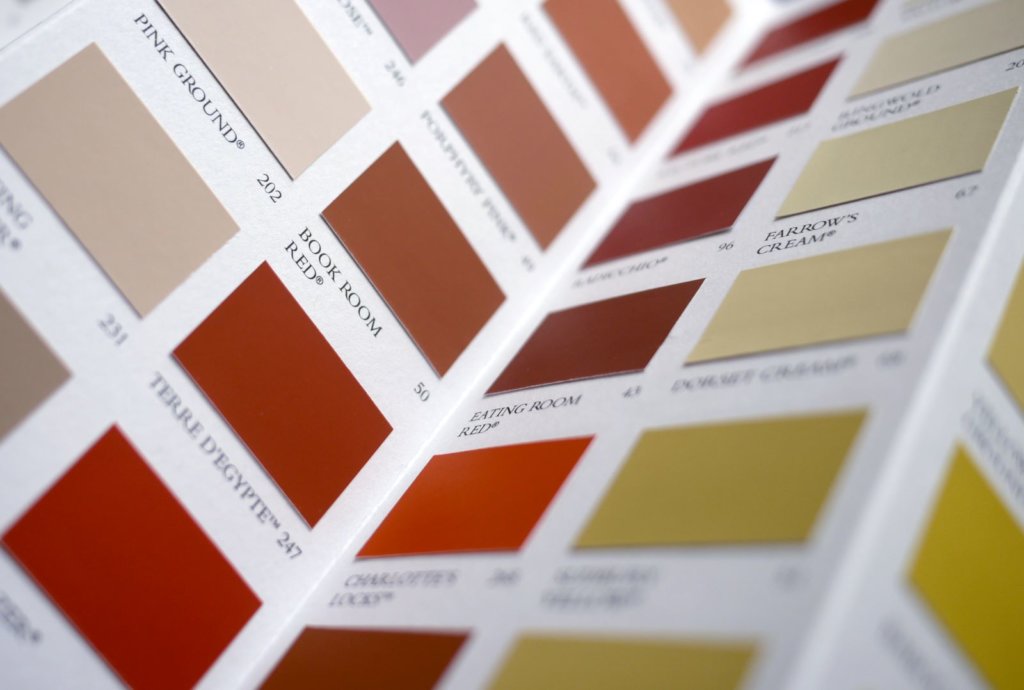
I purposely chose reddish paint swatches. Photo by Brett Jordan on Unsplash
So heck yeah I’d like to pretend none of this is real. Why am I sharing this? Because I ascribe to psychotherapist Michael Eigen’s philosophy. He wrote in his book Feeling Matters:
“As long as feelings are second-class citizens, people will be second-class citizens. Experience is an endangered species. An important function of psychotherapy is to make time for experiencing. Psychic taste buds really exist and rarely rest. They feed us each other, gauge states of being, states of spirit. We taste each other’s feelings and intentions.”
This is me offering up my state of being, my state of spirit. It’s not fun, it’s not pretty, but it’s real. And if anger remains unexpressed, it can turn into depression, which explains how I’ve felt this week watching holiday movies and realizing I will not have any of those experiences. I will not be at a holiday party. I will not be opening gifts with my siblings. I will not have a big indoor dinner with anyone. At first it depressed me but now I’m mad. I’m giving a big middle finger to this pandemic because it deserves it.
At the same time because life is complicated, I’m also grateful for the pandemic. This weekend I organized a Zoom call with the young people in my yoga and meditation group and we had attendees not only from the U.S., but also Mexico, Brazil, Portugal, Italy, Germany, and Denmark. I’m not sure that would have happened if we weren’t forced to socialize over the internet. Similarly, I’m seeing several of my college friends every week as we gather for a virtual Shabbat service. That also wouldn’t have happened without this pandemic.
Life is weird and complicated. And that means I can feel profoundly pissed off as well as profoundly grateful. Both can be true. I think being a fully functional adult means holding the paradox over and over again. It means allowing opposing things to occupy the same place. It means recognizing nuance. It means seeing shades of gray. And it also means creating space for our feelings.
I dream of a world where we express our emotions. A world where we feed our psychic taste buds. A world where we allow ourselves to feel happy and sad and angry and grateful and whatever else arises. Because ultimately we know life is nuanced.
Another world is not only possible, it’s probable.
I have to admit, I’m relieved the election is over and also that Biden won. I danced with joy and cried watching Kamala Harris give her speech on Saturday night. However, I know other people feel differently. There’s a part of me that still doesn’t understand how people can vote for a man who literally puts children in cages. Or how Kentucky residents reelected Mitch McConnell who laughed, laughed! when his opponent Amy McGrath criticized him for holding up a COVID-19 relief bill.
Are Kentuckians not suffering? Are they all employed and unaffected by the pandemic? Obviously not, so why would they vote for a man who clearly doesn’t care about their wellbeing? The first answer is that people like the familiar even if it’s toxic. It’s why they stay in jobs they hate or with people who are abusive. Change is hard. The second answer goes back to a question a dear friend of mine asks: “What is the boundary of your identity?”
There are people in the U.S. who only identify with people who look like them, act like them, think like them. And they vote accordingly. Research supports this. NBC News reported back in 2018 that when intolerant White people fear democracy may benefit marginalized people, they abandon their commitment to democracy.
“[P]eople who said they did not want to live next door to immigrants or to people of another race were more supportive of the idea of military rule, or of a strongman-type leader who could ignore legislatures and election results,” the research found.
It all comes down to fear but also groupism. I want to point out Democrats and progressives do this too – they also identify with people who think like them and act like them. And for those who don’t, they’re demonized and denigrated. They are not a part of the “in” group. No one, myself included, is immune from groupism and it takes commitment to keep expanding the boundary of your identity. However, whenever I think about the world I want to live in, it always hinges on universalism and cooperation. It always hinges on seeing myself in others.
So how do we do that? Some people practice a loving-kindness meditation, or perhaps they follow the work of Dr. Candice Nicole, who seeks to help people become less racist, sexist, classist, etc. As for me, I practice seeing the divine in everyone, extending the feeling of love to everyone. In the spirit of moving our world to a collective, cohesive one, here is a meditation that I created:
Sit in a comfortable position. Close your eyes and inhale, filling your belly. Notice it rise with each inhale and fall with each exhale. Do that twice more, inhaling and exhaling. Think of a person or animal that you love deeply. Notice the feeling in your body when you think of this person or animal. Do you feel warmth in your chest? Is there a smile on your face? Just notice whatever arises as you feel love toward this being.
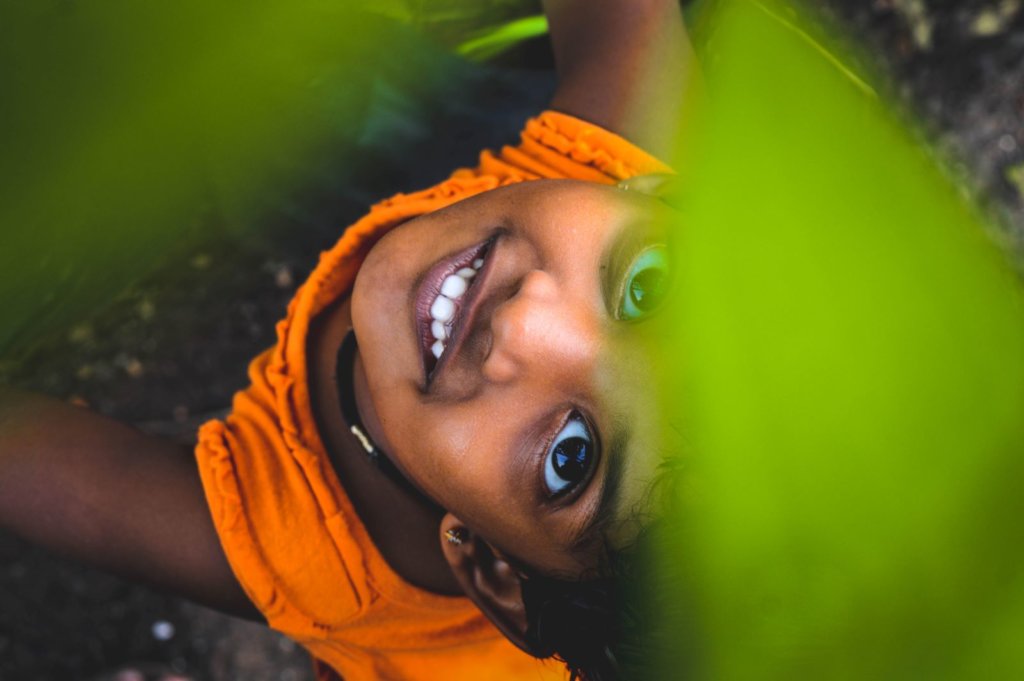
Looking at this cutie pie puts a smile on my face! Photo by Sharath Kumar Hari on Unsplash
Let the image of this person or animal fade away so all that’s left is the feeling of love in your heart and body. Take three more deep breaths as you let yourself bathe in this feeling of love.
As you let yourself bathe in this feeling of love, recognize this feeling is always with you. It lives in your heart and your body. It doesn’t require the presence of anyone else and is something you can feel at any time if you choose.
Now imagine a person who doesn’t look like you or think like you. Maybe they’re Black or White. Maybe they’re progressive or conservative. Before letting yourself feel scared, or angry, or whatever feeling usually arises, bring to mind the person or animal that you love. The being you conjured previously. Imagine the person or animal you love standing in front of the person you have trouble identifying with, acting as a shield. Notice you can still feel love even in the presence of this other person.
As you let the feeling of love come back into your body, imagine the person you have trouble identifying with shrinking. Shrinking until they’re one inch tall. Once the person is one inch tall, imagine the person or animal you love scooping up that one-inch person and placing them in their heart. That one-inch person has now merged with the being that you love, has dissolved into the being you love. Again, notice the feeling of love in your heart. Be aware that you still love this person or animal even though they now carry the same particles as the one-inch tall person.
Feel your heart soften as you realize we all have the same particles as every created being in this universe. And also that you can extend your feeling of love. Take three more deep breaths into your belly. When you’re ready, open your eyes. As you do, remember you are helping to bring more love into the world. And more love means a better world for us all.
Another world is not only possible, it’s probable.
I’m freaked out by the upcoming election and I know I’m not the only one. Democrats are worried Republicans will win. Republicans are worried Democrats will win. We are all watching this election closely. I don’t have any advice about that but what I can say is regardless of what happens, I feel soothed thinking about something I learned recently.
You may already know this, but Harvard University political scientist Erica Chenoweth discovered in order to enact change requires only 3.5% of the population actively participating in protests. She told the BBC in 2019: “Numbers really matter for building power in ways that can really pose a serious challenge or threat to entrenched authorities or occupations.” And furthermore, nonviolent protest seems to be the best way to get that widespread support. Once that 3.5% threshold is reached, success is inevitable.
“There weren’t any campaigns that had failed after they had achieved 3.5% participation during a peak event,” Chenoweth said. Examples of such movements include the People Power movement in Manila that folded the Marcos regime, the Singing Revolution in Estonia in the late 1980s, and the Rose Revolution in Georgia in early 2003.
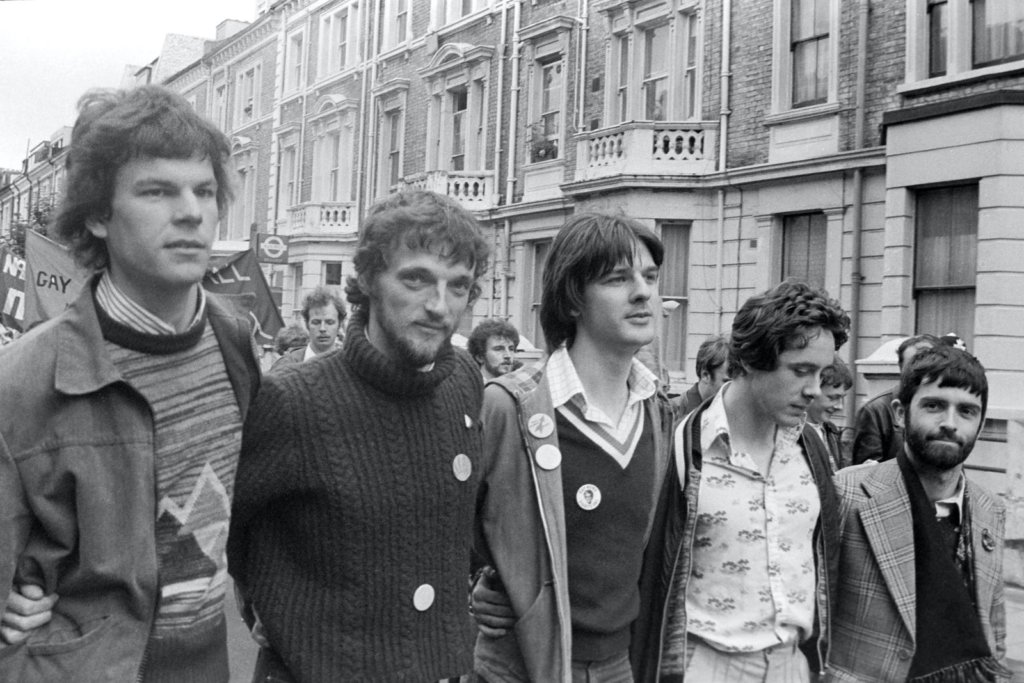
I love this picture because it’s from London’s Gay Pride parade in 1978. It’s a good example of how a minority can tip the scales of public opinion. Photo by Ian Sanderson on Unsplash
For the United States, 3.5% of the population is around 11 million, which is more than the number of people living in New York City. That number sounds like a lot when it’s phrased that way, but relatively speaking, the number isn’t that large. There’s something inspiring for me about knowing it only takes a fraction of the population to actually change things. So often I think change happens when the majority of the population is on board with something and how often does that happen? Chenoweth’s research shows otherwise, although an important caveat is that she thinks when the 3.5% threshold is reached, it’s indicative a larger swathe of the population feels similarly. But still.
As someone who cares a lot about people and the environment, I feel better knowing I don’t have to convince everyone to feel the same way I do. I only have to convince a few people. Just kidding! I don’t think I can convince anyone of anything but I’d like to believe telling the truth has some effect. And a new truth I’ve learned is that pioneers don’t require a majority, or even a large minority, to move society in a different direction. They only require 3.5% of the population.
I want to close here with a quote from my spiritual teacher because it seems especially hopeful right now. He said: “Clouds cannot overcast the sun for a long time. The creatures of darkness never want the expansive exaltation of human society. Even then, humanity shall march ahead. None can arrest the speed of its progress. You be the harbingers; you be the pioneers of this victorious march. See that not a single individual lags behind.”
I dream of a world where the pioneers of social progress march ahead, inspiring others to join their cause. A world where we band together to ensure people and the environment are valued, respected, and cared for. A world where we realize a small minority has always pushed the envelope and made the world better for all of us.
Another world is not only possible, it’s probable.
I have to admit I’m feeling rather spiteful and vindictive. I’m pissed off at the hypocrisy of Mitch McConnell and his ilk regarding replacing Ruth Bader Ginsburg’s justice seat. I’m livid Breonna Taylor’s murderers – Brett Hankison, Myles Cosgrove, and Jonathan Mattingly – were not punished sufficiently for their crimes. I’m angry and frankly scared that Donald Trump will refuse to cede power if he’s voted out. Some vigilante justice sounds mighty appealing right now. However, I also remind myself what my spiritual philosophy says about justice.
First off, it’s a law of nature that for every action there’s an equal and opposite reaction. Actions have consequences, even if they’re not expressed right away. For instance, my spiritual teacher was on a walk with someone when they passed by the house of a Brahmin who just died. My spiritual teacher told his companion:
“Though this man was a prominent member of the Brahmin community, he was not a pious man as befits a Brahmin. In fact, he was a sinful and greedy man who never reflected on his misdeeds or repented for them. He was full of caste vanity and arrogance. Throughout his life he treated the lower castes with scorn. What will be his reward for his pride and vanity? He will be reborn as a dog. If he wanders into a gathering of Brahmins, will they not treat him as an untouchable and drive him away, just as he did to others in this life?”
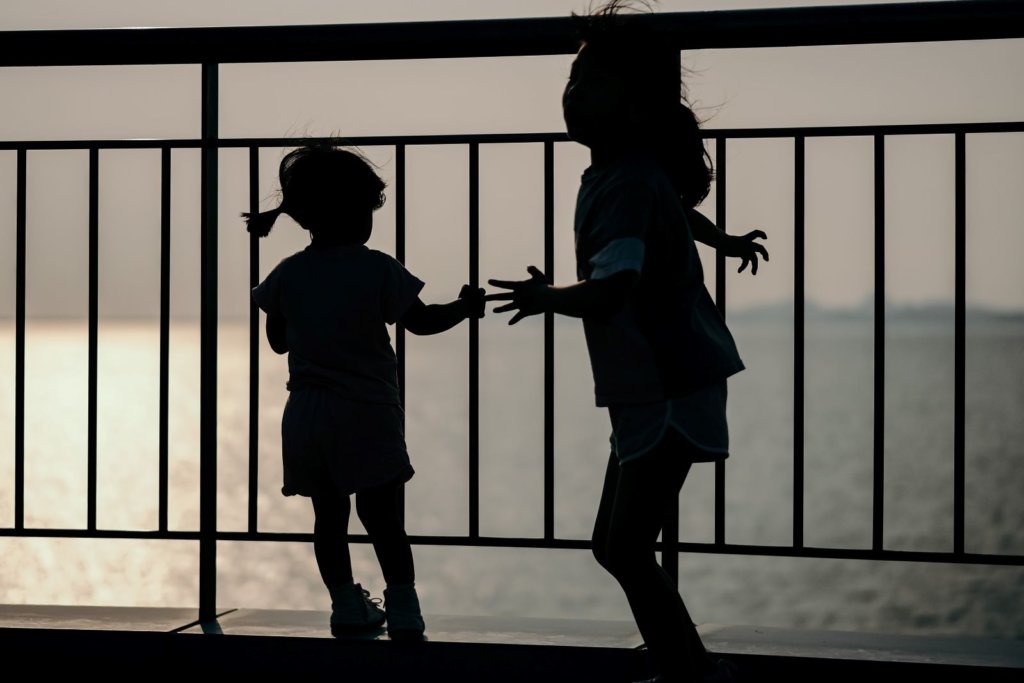
This picture felt like a good mix of imprisonment but also love. Photo by insung yoon on Unsplash
Actions have consequences, for better or for worse. What I notice in telling this story is some glee. My response is, “Good. You got what you deserved.” But sharing that I also feel a pinprick of discomfort because it’s mean-minded. I want to see people punished for their crimes but my spiritual teacher also says we don’t have the right to punish someone we do not love, and furthermore, the amount of punishment meted out must not exceed the amount of love we feel. Yikes. Why is that?
If life is about love, about seeing the divine in everyone, it makes sense that all actions are to be taken with that spirit. If I punish someone out of spite, it creates a feeling of vindictiveness. My mind degrades and the person punished also likely feels resentment. Instead, punishment should be corrective in nature. My spiritual teacher also says, “If a system of corrective measures is introduced, criminals, whether they were deeply involved in the crime or not, will have no reason to complain against anyone. Although there may be flaws in the judgment, it will not harm them in any way. A person who is definitely guilty will benefit from a system of corrective measures, and even a person who is not guilty will benefit from such a system.”
I know I’m being challenged right now to maintain my feelings of love, but what softens my heart is thinking power-hungry people are sick. Those who don’t care one iota about anyone other than themselves are mentally ill. Those who seek to divide others, to promote inferiority and superiority are unwell. As a society, we must take corrective measures – I’m not suggesting we throw our hands up in the air and excuse anyone’s behavior – but can we continue to see God in everyone, especially people we don’t like? That’s the practice anyway.
I dream of a world where we realize the universe will restore balance without any input from us. A world where we recognize actions have consequences for better or for worse. A world where we try to correct others instead of punishing them. A world where we see God in everyone, even people we want to punish.
Another world is not only possible, it’s probable.
I keep thinking about boundaries both because of what’s happening in my personal life and also in the world.
This week a woman told me I need better boundaries. Even thinking about her comment I notice anger rising up in me because I want to say, “Screw you lady! You have NO IDEA how much work I’ve done around boundaries!” which is true. I’ve come a long way. It’s not that I was ever a doormat, but it’s fair to say I wasn’t far removed from one. I often said “yes” when I wanted to say “no” because it was easier to acquiesce to someone else than stand up for myself. It was easier to sacrifice my needs and wants to keep the peace.
However, there comes a point where if your mouth doesn’t say no, your body will. Maybe you’ll get sick and that will give you an excuse to skip the party you originally said you’d attend. Or you could develop a more serious health condition. That’s the whole premise of the book When the Body Says No by Dr. Gabor Maté. He makes the case that stress and emotions play a role in diseases such as arthritis, cancer, diabetes, heart disease, irritable bowel syndrome, and multiple sclerosis. I certainly found his premise to be true with me. Because I overextended myself, my body eventually said, “Nope. Can’t do it anymore!” These days I’m more cautious with how I spend my energy.
Am I still learning about boundaries? Yes. Do I still regularly give more of myself than is wise for my body? Yes. But that’s OK because boundaries happen in degrees. They are learned and practiced – they’re not a switch that get turned on or off. They’re more like a faucet that can run at full power or at a trickle.
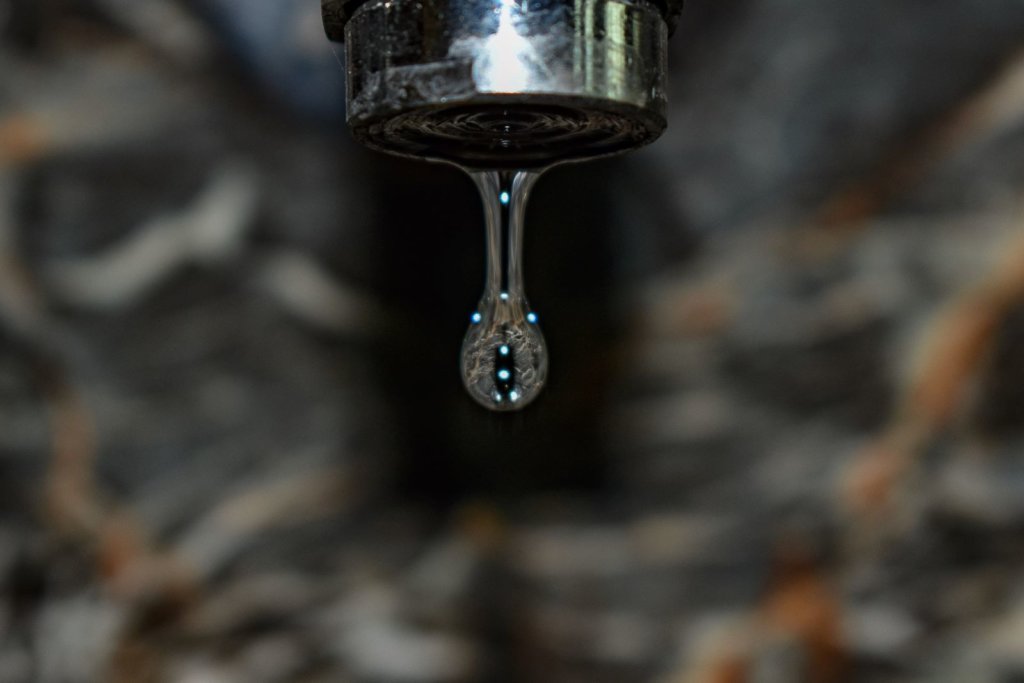
Boundaries can run at a trickle or full blast. Photo by Mukesh Sharma on Unsplash
That reminder about boundaries operating in degrees seems relevant right now as the U.S. celebrates Labor Day. The holiday came about because in the late 1800s, the average person worked 12-hour days, seven days a week. Not only adults, but children as young as 5 worked in mills, factories, and mines. On top of that, working conditions were not safe, there was insufficient access to fresh air, and limited sanitary facilities and breaks. People started protesting and were killed by the police during those protests, but eventually the unions were successful and working conditions changed.
We have a lot to be grateful for this Labor Day, and at the same time, there’s still room for improvement. For instance, last year the news reported Amazon workers were peeing in bottles because they were scared to take bathroom breaks. And they’re not the only one: Tyson Foods workers admitted to being denied bathroom breaks or mocked for even asking, according to an Oxfam report. The result? Many Tyson workers wore adult diapers to work.
I don’t mention these two examples purely to horrify you but rather to ask how much do you value your own life and the lives of others? Enough to change your shopping habits? I have. For the past few years, I’ve boycotted Amazon – not perfectly because there are some things only Amazon sells, but where possible I spend my money elsewhere. And look, I know they’re super convenient, but every little bit helps – canceling a Prime membership, looking further afield for purchases – it all adds up. What would our world look like if collectively we said, “No, it’s not OK to treat people like robots, to risk their lives, and deny them dignity”? If history is any indication, not only can it be done, but it also makes life better for everyone, as evidenced by those of us in the U.S. celebrating a three-day weekend.
I dream of a world where we set and maintain boundaries. A world where we understand the importance of saying no. A world where we realize boundary setting happens in degrees. A world where we celebrate what we’ve accomplished and recognize we also may have more room to grow.
Another world is not only possible, it’s probable.
The other week I saw a comment on a friend’s Facebook post that said certain people in the U.S. have a victim mentality and there are plenty of opportunities and resources to get ahead if they wanted. The comment has stuck with me like a burr in wool. I went to reply to the post and of course now I can’t find it so instead I’m writing a blogpost about it.
There’s a difference between a victim mentality and actually being a victim. For instance, in Pennsylvania, two separate studies found holding poverty as a constant, the Whiter the school district, the higher the funding. On average, the Whitest districts received thousands of dollars more than their fair share for each student, while the least White districts received thousands less for each student. Is that a “victim mentality” or actually being a victim?
In another example, four mothers are suing Jackson, Mississippi, because the school their kids attended lacked textbooks, basic supplies, experienced teachers, tutoring programs, after-school literary programs, and even toilet paper! Would you tell those children they should pull themselves up by their bootstraps and work even harder? Or maybe you’d advise a different approach and say those parents should have transferred their kids to another school, to do whatever it takes to give their kids a good education. A better question I think is why should the parents have to transfer their kids? What ever happened to the promise made to us by the state to provide a uniform system of free public schools?
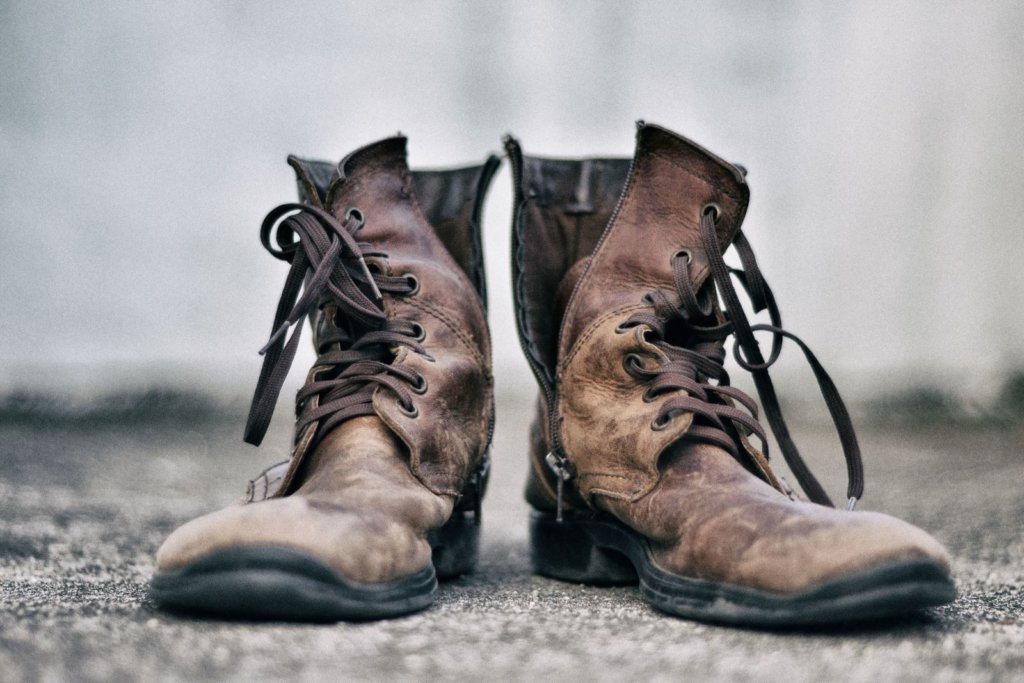
This picture makes sense if you think about the title of this post. Photo by Oziel Gómez on Unsplash
At this point some people may start talking about Darwin and survival of the fittest. How we’re playing out something inherent to human beings and our evolution. “Survival of the fittest” is an outdated idea that’s used to support callousness. The reality is we don’t live in a society where survival of the fittest operates. We have healthcare, we put curb cuts onto sidewalks to allow for wheelchair users and strollers, we have unemployment assistance. For the roughly 30 million Americans who are unemployed are we saying too bad, so sad but figure it out on your own? No. Because human beings are more compassionate than they are callous. We are more cooperative than competitive.
In fact, in 1965 when six Tongan boys were shipwrecked for 15 months they didn’t reenact Lord of the Flies – they worked together to help each other survive. That’s what human beings do. My spiritual teacher takes it a step further and says it’s our responsibility to take care of one another.
“You should always be vigilant that not a single individual of our collective body is in the least neglected or ignored,” he said. “Let not a single boy or girl feel within them that no one is concerned about them – let not a single person be allowed to think, ‘No one cares whether I have taken food or not.’ You must pay special heed to this. Particularly those of you who are in responsible positions of leadership should remember that … [Y]ou should always be concerned with others necessities, not your own. You should always think more about your duties and responsibilities than about your rights.”
Those are some strong words. I think there’s a balance because living in the society that we do, not everyone has this service mindset so it is important that I think of my own necessities otherwise I could go hungry. However, can you imagine what life would be like if we lived this way? If we felt responsible for other people in a non-codependent way? Sounds idyllic to me and exactly the sort of world I want to live in.
I dream of a world where we are concerned with others, not only ourselves. A world where every person feels cared for. A world where we feel responsible for each other. A world where every person is allowed to thrive because the collective supports them in doing so.
Another world is not only possible, it’s probable.
I have a tendency to idealize people, especially leaders. Not government officials because their peccadilloes are well documented, but other leaders like Gandhi and Dr. Martin Luther King, Jr. However, everyone has their flaws. Gandhi was a racist and had some weird, perhaps even abusive, sexual behaviors. Dr. King cheated on his wife. Did both of these men contribute to society and deserve recognition for that? Absolutely. But were they perfect? No.
That’s quite common actually for revolutionaries. I’m going to quote Rutger Bregman from a super-long article in The Correspondent. He read a book by British journalist Helen Lewis called Difficult Women that chronicles the history of feminism in Great Britain. In the book she makes the point many revolutionaries are difficult. Progress tends to start with people who are obstinate, obnoxious, and deliberately rock the boat. Also, doing good work in the world doesn’t mean a person is perfect.
Bregman writes: “Lewis’s criticism is that many activists appear to ignore this complexity, and that makes them markedly less effective. Look at Twitter, which is rife with people who seem more interested in judging other tweeters. Yesterday’s hero is toppled tomorrow at the first awkward remark or stain of controversy.”
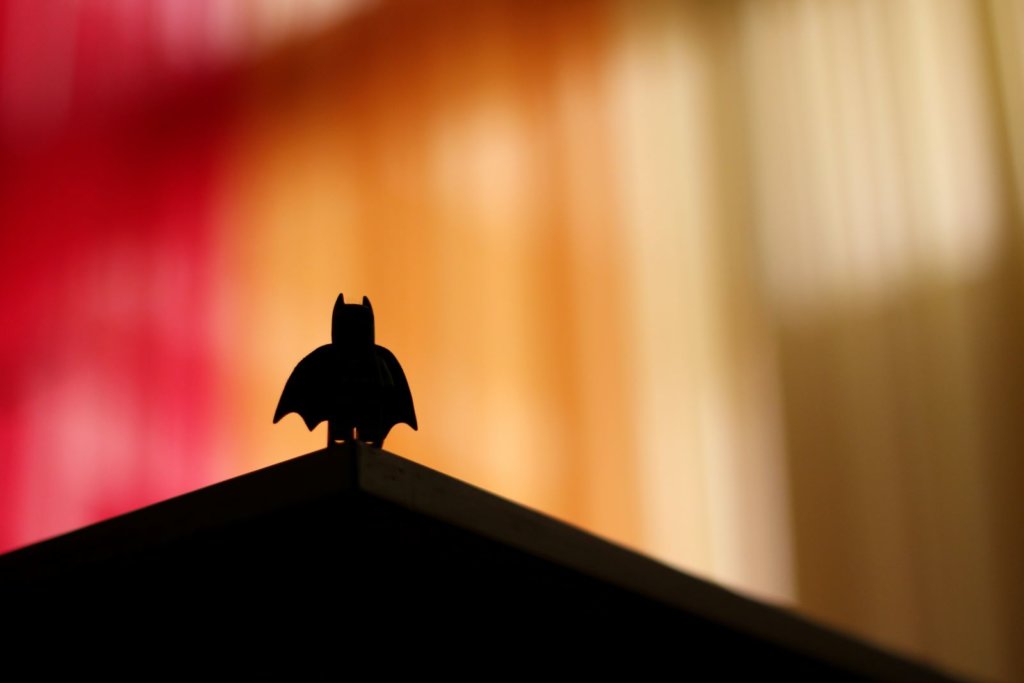
I know it’s a little silly to use a Batman figurine to illustrate this post, but Batman is a human and he’s a hero so. . . Photo by Ali Kokab on Unsplash
I’m reminded you don’t have to be perfect to make great change in the world and in fact, I take heart in that regular people with passion do that all the time. As we’ve recently celebrated Pride, I’d like to mention one such person: Marsha P. Johnson, a Black trans woman, who played a key role in the fight for LGBTQ equality. Three passionate Black women making a difference today are the co-founders of Black Lives Matter: Patrisse Khan-Cullors, Alicia Garza, and Opal Tometi.
You obviously don’t have to be a saint to be a leader, to be a spiritual revolutionary. My teacher says true leaders or spiritual revolutionaries work to achieve progressive changes for human elevation on a well-thought, pre-planned basis, whether in the physical, metaphysical, or spiritual sphere and they follow an ethical code. That ethical code includes things like not intentionally harming others, practicing benevolent truthfulness, not stealing, sacrificing to serve others, etc.
Today I am reminded that you and I can also be leaders in our own right, in our own way. If we are working to elevate humanity and doing our best to be ethical people, we fall into that category. We may never have the notoriety of any of the leaders I mention in this post, but we’re still leaders and the work we’re doing still matters. We need different people playing different roles to create change.
I’m going to end with another quote by Bregman here. He says:
“Our inclination – in talk shows and around dinner tables – is to choose our favorite kind of activism: We give Greta Thunberg a big thumbs up but fume at the road blockades staged by Extinction Rebellion. Or we admire the protesters of Occupy Wall Street but scorn the lobbyists who set out for Davos.
“That’s not how change works. All of these people have roles to play. Both the professor and the anarchist. The networker and the agitator. The provocateur and the peacemaker. The people who write in academic jargon and those who translate it for a wider audience. The people who lobby behind the scenes and those who are dragged away by the riot police.”
I dream of a world where we all work together to make a better society. A world where we recognize we all have the capacity to be leaders. A world where we remember we don’t have to be perfect to make a difference. A world where we see ourselves for the heroes we are.
Another world is not only possible, it’s probable.
